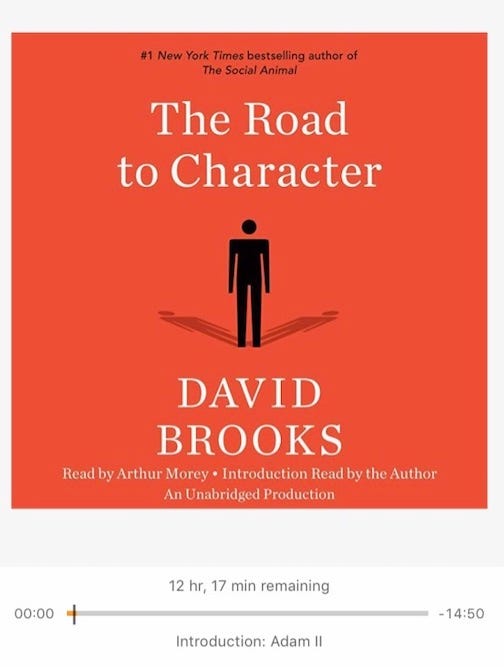The Road to Character by David Brooks

The description of this story interested me. Character is something that I closely value and I think that I can always improve as I narrow in on my core values even more. Character being explained as a road, a journey, and a lifelong process is a great way to look at, I wanted to learn more.
This is quite crazy. Maybe they should have asked if they were considered to be a very important person to someone in particular. Is this a bad thing? Maybe not. But here’s what God says in Isaiah 66:2, “This is the one to whom I will look, he who is humble and contrite in spirit and trembles at my word.”
The Gallup organization asked high school seniors if they considered themselves to be a very important person.
In 1950, 12% said yes
In 2005, 80% said yes
The median narcissism score has risen 30% in the last 20 years.

And people wonder why today’s education system is failing students. One reason might be that we are no longer looked at as individuals but rather as those who need more intelligence. Unfortunately the individual and inner self seem to be overlooked in most cases.
Today teachers look for their students’ intellectual strengths so they can cultivate them.
A century ago, teachers looked for their students’ moral weaknesses so they could correct them.
I don’t remember exactly what this example was that the author was highlighting for his readers here. However, considering the wide-spreading impact is essential.
She had an obligation to follow her individual conscience but it was her moral duty to mute her own impulses by considering their impact on others and the social community.
I agree with this. People who believe that they are not only a very important person but the most important will drown. They will drown themselves. We were not created to be individuals but a community.
People who see themselves as the center of their solar system often get enraptured by their own terrible but also delicious suffering; people who see themselves as a larger universe and a longer story rarely do.
I love the way love is explained here, ironically enough. But truly, love opens us up to so much more. Without love, we can never be fulfilled. That is why I believe that we must first love ourselves more than any individual we have ever met. If don’t fully love ourselves, how can we ever expect anyone to love our flaws?
Love is a state of poetic need. Love opens up the facility for spiritual awareness. It is an ultra state of consciousness that is intense and overwhelming but at the same time, effervescent.
Continuing to expand on the importance and value of love, here is what the author says:
One love magnifies the capacity for another.
Love expands with us.
Love makes people kinder and more open to life.
When pride is explained in this way, I want to stop, drop, and run in the complete opposite direction. It’s stated in the Bible to never be prideful, we are warned numerous times — especially in Proverbs. It’s never just because of us that something happens. If you generated $10 million in revenue as a salesman for your company, you didn’t do that alone… people bought something from you. We are more than our work. Whether we are successful in our work or not, we should maintain happiness, shouldn’t we? I think so.
Pride is building your happiness around your accomplishments. It is using your work as a measure of your work. It is the belief that things are a result of your individual efforts.
To finish the book, the author shared what he coined, “the humility code.” I believe that each and every one of these 12 things is essential. The first 3 remind me of where I came from. The 7th keeps me moving forward. And the 9th and 10th remind of me why everything we are called to do in life is 100% possible.

The humility code:
1. We don’t live for happiness, we live for holiness.
2. Proposition 1 defines the goal of life, the core of that understanding is that we are flawed creatures, we have a tendency to see ourselves as the center of the universe.
3. Although we are flawed creatures, we are also splendidly endowed, we sinned but can recognize it, we thus have the capacity to struggle with ourselves.
4. In the struggle against weakness, humility is the greatest virtue.
5. Pride is the central vice, pride blinds us to the reality of our divided nature, pride misleads us into thinking we are better than others.
6. Once the necessities for survival are satisfied, the struggle against sin & for virtue is the central drama of life, the purpose is not to win but to get better at waging it.
7. Character is built in the course of your inner confrontation. It is a set of dispositions, desires, and habits that are slowly engraved during the struggle against your own weakness. Become more considerate, loving, and kind through thousands of experiences of self-control.
8. The things that lead us astray are short term: lust, fear, vanity, gluttony. The things that we call character in the long term like courage.
9. No person can achieve self-mastery on his or her own, we all need redemptive assistance
10. We are all ultimately saved by grace. The shape of life is: advance, retreat, advance, retreat. The message is the same, hands are holding you up, accept the fact that you are accepted.
11. Defeated weakness often means quieting the self, struggle against weakness requires the habits of self-effacement, readiness, modesty, obedience, and capacity for reverence or admiration.
12. Wisdom

I grew from this book. I became better. I spent time deeply examining who I am at this present time; I spent time in prayer with God and let Him tell me who I am. Now, I continue to increase my awareness of who I am becoming and why. I continue to seek God’s guidance in the molding of me; I love it when he is called the master potter.
I gave this book a 4/5